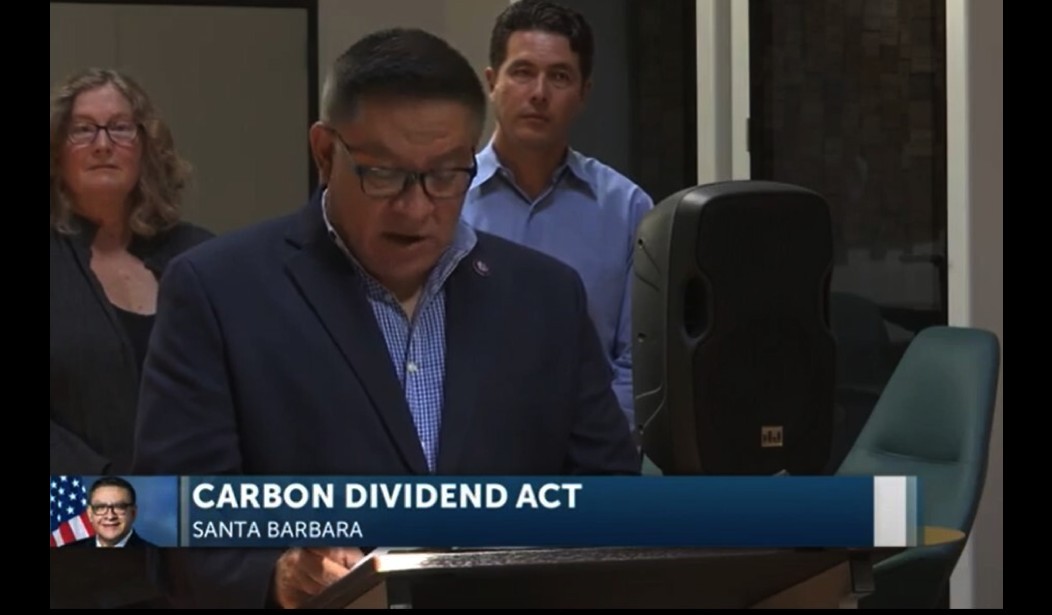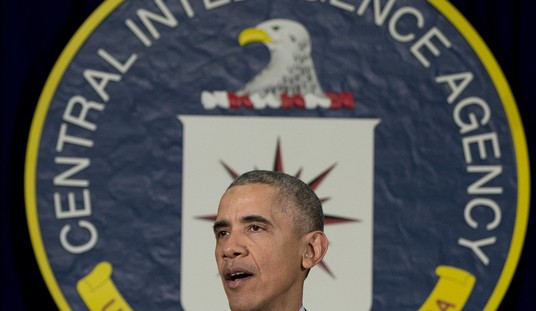United States Congressman Salud Carbajal (CA-24) visited the Community Environmental Council Hub in Santa Barbara this week to announce his plan to introduce The Energy Innovation and Carbon Dividend Act of 2023.
He calls his newest legislative proposal a simple market-based climate change solution at a time when people can't turn on the TV without seeing the consequences of climate change.
Full disclosure: Rep. Carbajal and I worked together in local government on local economic initiatives (the type of policy solutions that, when viewed from a nonpartisan political lens, actually made sense). For example, together, we secured funding for improved transportation programs, including for more capacity on the 101 Freeway, and building out and fixing highways, streets, and roads throughout the region.
However, today, now that Salud spends most of his time in Washington DC’s hyper-partisan swamp, he has become a true believer in the left's climate change dogma, suggesting it’s wreaking havoc with deadly floods, longer heatwaves, and wildfires in unexpected places despite evidence to the contrary.
Since 2013, climate hoaxers have changed climate history by erasing the 1998-2014 global warming pause, and cooling the early 20th century.
— Steve Milloy (@JunkScience) September 26, 2023
Not science. Shenanigans.https://t.co/31bWgB5U4y pic.twitter.com/jCgjzP4BUu
He says it's also causing disruptions in agriculture and tourism and that we must take action now.
Contrary to the claims made in his proposal, putting a high price on carbon through the Energy Innovation and Carbon Dividend Act would have detrimental effects on our economy and the everyday lives of working families. While it may seem like a well-intentioned solution, several points should be considered before implementing such a radical policy.
First, placing a high price on carbon would inevitably lead to higher energy costs for businesses and consumers. This burden would be passed down to everyday Americans through increased costs to nearly everything we buy, ultimately hitting low-income households and financially strained small businesses the hardest.
Indeed, this regressive proposal would place an unfair financial burden on those who can least afford it, hindering economic growth and better-paying jobs while exacerbating income inequality. Moreover, the claim that corporations will be financially incentivized to use less fossil fuel and invest in cleaner energy sources ignores the complex realities of our global energy market and America’s existing energy infrastructure.
Many industries and businesses heavily rely on affordable energy to operate efficiently. By imposing a high price on carbon, his legislation risks driving up costs for these industries, potentially leading to job losses and a decline in competitiveness for American businesses competing in a global market.
The proposed carbon fee and dividend approach also assumes that the government can effectively and efficiently redistribute the revenue generated. Unfortunately, history has shown that such attempts often lead to bureaucratic inefficiencies, and there is no guarantee that the funds will be effectively directed toward sustainable and environmentally friendly initiatives.
More revenue for the federal government only to be used for government-directed spending inevitably results in an inefficient allocation of resources that are better left to those who can and will put that capital to more productive uses, including plant and equipment upgrades, innovations, research, and better technology.
Furthermore, Rep. Carbajal's projected reduction in carbon emissions by 2030 relies on the assumption that industries and consumers will seamlessly transition to "greener" energy sources. However, transitioning to renewable energy is a complex process requiring significant infrastructure investment and technological advancements.
Reliable and affordable renewable energy is not years away. It is still several decades away.
Setting ambitious renewable energy targets without considering the practical challenges will surely result in inadequate and unsustainable solutions, leading to less reliable and more expensive electricity generation to cool our homes in the summer and heat them in the winter.
It is also important to note that while Rep. Carbajal’s green proposal focuses on the environmental impact, it does not adequately consider the inevitable economic consequences. The energy sector plays a vital role in the American economy, employing millions of people and contributing extensively to our GDP and badly needed revenue for many of the most essential public-sector programs and services.
Implementing a new high cost of carbon without considering the broader economic implications, such as job losses and economic downturns, could have severe consequences for American workers and businesses and the communities and local economies they support.
Rep. Carbajal, who I know well and like personally, was always a well-intentioned public official while serving at the local level. And while his goal of mitigating climate change is no doubt sincere, his proposed legislation to put an arbitrary price on carbon is not the most effective or practical approach.
A more balanced and market-oriented approach would promote innovation, technological advancements, and abundant and reliable energy, such as natural gas and nuclear power, which would provide a far more practical and cost-effective solution.
Contrary to those who claim otherwise, natural gas has significantly reduced carbon emissions compared to coal and is abundant domestically, reducing our dependence on foreign energy sources. Additionally, nuclear power is a reliable and low-emission source that can contribute to a cleaner energy future.
Therefore, rather than imposing a high price on carbon, Congress should focus on incentivizing innovation through research and development tax credits. This approach has a proven track record of driving technological advancements and breakthroughs.
Investing in market-driven initiatives for clean energy research, development, and deployment will address Salud’s climate concerns, create good-paying jobs, and bolster economic growth throughout America, including in his own congressional district where some communities, particularly minority communities, have unacceptable levels of poverty.













Join the conversation as a VIP Member